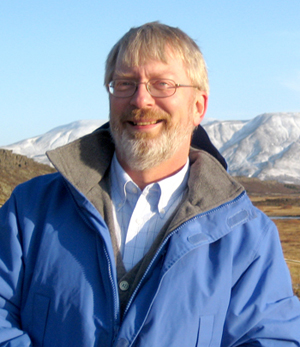History professor wins major grant for research on Arctic science

A Florida State University historian who leads an international team working to produce a comprehensive modern history of the Earth's northernmost region has won the largest individual research grant ever received by a member of his department.
Ronald E. Doel, an associate professor in the Department of History, is the recipient of a $489,000 grant from the National Science Foundation (NSF) for his research project, "Constituting the Arctic Environment: How U.S. Military Patronage After World War II Influenced the Environmental Sciences in the Far North." The project is part of a larger study funded by the European Science Foundation titled "Colony, Empire, Environment: A Comparative International History of Twentieth Century Arctic Science."
"This is an extraordinary opportunity to expand our understanding of the north, particularly the role that the explorations and perceptions of natural scientists have played in shaping our impressions of this fascinating region," said Doel, who studies the history of recent science and technology. "I am particularly grateful for the NSF's support of this research, for Florida State's enthusiastic reception of this opportunity, and for the chance to work with international scholars as well as Florida State colleagues and students on this project."
With the NSF grant, Doel will examine the role of the military in shaping scientific understanding of the Arctic and influencing the environmental sciences. He explains that in 1947, the Pentagon first became interested in polar warming and global climate change. It did so not because of concerns about the natural environment, however, but because of pragmatic defense issues.
"The prospect of climate change in high latitudes left military authorities worried about the United States' ability to confront the Soviet Union in the high Arctic, where a military conflict with its emerging Cold War adversary seemed increasingly possible," Doel said.
Doel plans to complete research for a book that will be "not only a history of science in the north, but will increase our understanding of the rise of the physical environmental sciences in the 20th century." His research examines how U.S. earth scientists, working alongside military patrons and planners, "developed research programs to understand the northern environment, requiring often-challenging interdisciplinary collaborations between glaciologists, meteorologists and oceanographers."
Among other ways that the grant will advance Doel's Arctic research:
- It will provide funding for history department Ph.D. students at Florida State who are interested in working on this topic.
- It will allow for the recruitment of a postdoctoral researcher to come to Florida State to work for a year on science history in the north — and interact with faculty and graduate students across the campus.
- It will provide support to help bring Doel's international research group — its other members hail from Canada, England, Norway, Denmark, Sweden and Russia — together for workshops, including one at, the capital city of the new Canadian federal territory of Nunavut, in September; in Rovaniemi, Finland, in late October; and at Florida State in 2010 or 2011.
"This is a tremendous opportunity for the university to play a leading role in furthering understanding of a critical era in our recent history," Doel said. "Understanding how the physical branches of the environmental sciences emerged is important for developing effective science and public policy today."
"This is an extraordinary opportunity to expand our understanding of the north, particularly the role that the explorations and perceptions of natural scientists have played in shaping our impressions of this fascinating region."
Ronald E. Doel
Florida State University Department of History
